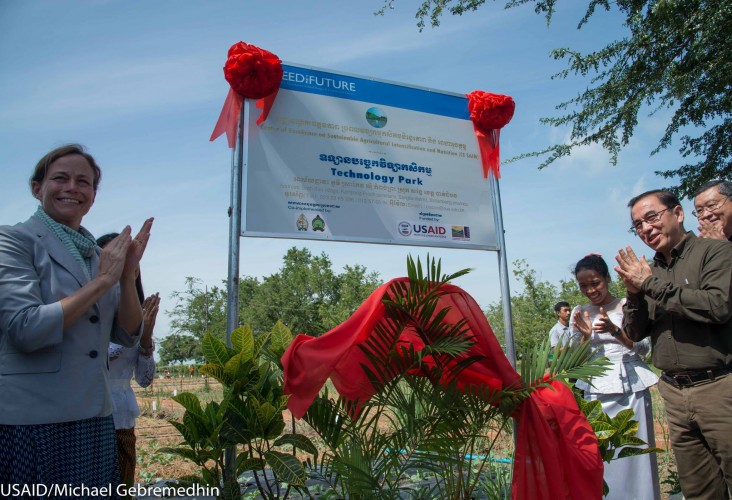
(as prepared for delivery)
- Your Excellency, Veng Sakhon, Minister of Agriculture, Forestry and Fisheries
- Your Excellency, Chan Sophal, Governor of Battambang province
- Your Excellency, Bunthan Ngo, Rector, Royal University of Agriculture
- Your Excellency, Sieng Emtotim, Rector, the University of Battambang
- Distinguished guests, ladies and gentlemen.
It is exciting for me to inaugurate the first of five new Technology Parks of the Center of Excellence on Sustainable Agricultural Intensification and Nutrition, or CE SAIN. I would like to take this opportunity to thank the Royal University of Agriculture and the University of Battambang for hosting this event. I would also like to extend my sincere thanks to His Excellency Veng Sakhon and His Excellency Dr. Ngo Bunthan for joining me and Ambassador William Heidt when we launched the Center of Excellence last September.
CE SAIN’s goal is to ‘transform agri-food systems through agricultural research, education and innovation.’ This transformation shifts food production from soil- and labor-intense methods that degrade the environment to those that actually enhance the environment. This is known as sustainable intensification. Sustainable intensification improves resource efficiency and productivity without harming our land or water. This goal and all of USAID’s agricultural activities align with and support the objectives laid out in the Agricultural Strategic Development Plan of the Ministry of Agriculture, Forest and Fisheries.
Technology Parks, such as this one, are hubs for scientists and practitioners to develop, test, showcase and share high-potential, innovative technologies with sustainably intensify farming systems. The Parks will tailor-fit agricultural production systems at various agro-hydro-ecological zones in Cambodia. They will also demonstrate new, promising, and innovative technologies to farmers and extension workers that will increase their yields and improve soil health.
The Parks are also designed to attract private-sector investment in research and, hopefully, to create technology that can eventually be sold to farmers and others working in agriculture. In addition, events like innovation fairs, field days, and workshops will held for all those involved in the agriculture industry - from the small-scale farmers to wholesalers to grocery stores - so that everyone has access to the most current and cutting-edge technology. Finally, the Technology Parks will also be a place where scientists from U.S. universities - partnering with local universities - can showcase the results of their research and work with end users like farmers, input suppliers, and extension specialists.
Remember that we are talking about genuine benefits for real people. Farmers like EANG CHARIYA and PHORNG SARET from Puok District in Siem Reap Province. I met both of them earlier this year. They increased their vegetable production from two to five times per year and their incomes nearly three-fold after they adopted new innovative agricultural technologies from the research of the U.S. universities in partnership with R.U.A.
Can Ms. Charya and Mr. Saret stand up so we can all see you? Thank you for coming! The rest of us should feel free to talk with them and learn more about their experience. They are good examples of a typical family in Siem Reap. The husband grows vegetables and is a member of the Agriculture Cooperative. His wife collects and sells vegetable products to the local markets. The income from vegetable production and the profits from selling vegetable products are important for their family. Their kids can go to school, and they can give good nutritious food to their children.
I hope that their shared benefits can be equally enjoyed by farmers and their families right here in Battambang.
As I said at the start, I’m truly delighted and honored to be with you all here today. Let me thank - once again - the Royal University of Agriculture, the University of Battambang, the Governor of Battambang, and the Ministry of Agriculture, Forestry and Fisheries.
Thank you.
Related Speeches
- Remarks by Polly Dunford, Mission Director, USAID Cambodia, Launch Event of Feed the Future Cambodia Harvest II
- Remarks by Christina Lau, Deputy Director, Office of Public Health and Education, USAID/Cambodia, Opening Ceremony of the Kick-Off Workshop for “One Health Workforce”
- Remarks by Veena Reddy, Deputy Mission Director, USAID Cambodia, EPIC Showcase







Comment
Make a general inquiry or suggest an improvement.